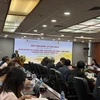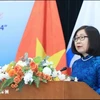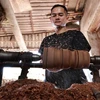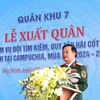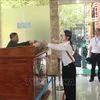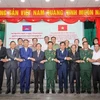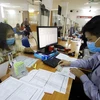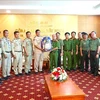The proportion of women engaging in the politics is increasing, showing the effectiveness of the State and Party’s policies that designed to enhance women’s role in society.
According to the Female Parliament Members Group under the Vietnam National Assembly’s Committee for Social Affairs, between 1999 and now, Vietnam always has a female vice president and women accounted for 25.76 percent in the National Assembly during the 2007-2011 tenure, the highest rate among eight ASEAN countries that have a parliament.
Vietnam also ranks 37th out of 188 countries worldwide in term of the rate of women in the legislative body, said the International Inter-parliamentary Union.
The proportion of female ministers, deputy ministers, department heads has raised over the past years. During the 2004-2011 tenure, women account for 23.8 percent of People’s Council deputies at provincial level and 19.5 percent at communal level, respectively.
In an effort to heighten women’s social positions, many laws have been promulgated such as the Marriage and Family Law, the Population Ordinance and the Law on Domestic Violence Prevention, and the Law on Gender Equality.
The laws on elections of the National Assembly and People’s Councils at all levels stipulate women’s right to elect and run for election as well as mechanisms to ensure women can exercise their rights.
The National Strategy on Gender Equality for the 2011-2020 period has set the target to raise the proportion of women in Party Committees in the 2011-2016 period to over 30 percent and to more than 35 percent in 2016-2020.
By 2020, 95 percent of ministries, ministry-level agencies, governmental agencies, People’s Committees at all levels and 100 percent of Party and State agencies and socio-political organisations are projected to have women holding key positions.
In preparation for the elections of the 13 th National Assembly and People’s Councils at all levels slated for May 22, the National Committee for the Advancement of Women has worked with the Vietnam Women’s Union (VWU) to launch campaigns to encourage women to cast their ballots and garner support for female candidates.
Although Vietnam has reaped a lot of achievements regarding gender equality, barriers rooted in family and society such as traditional thinkings that women’s should stay at home to take care of family still remain, hindering women from joining social and political work.
According to Nguyen Thi Kim Thuy, Vice President of the VWU Central Committee, differences in several regulations regarding retirement and training age for men and women also limit women’s participation in management and leadership posts./.
According to the Female Parliament Members Group under the Vietnam National Assembly’s Committee for Social Affairs, between 1999 and now, Vietnam always has a female vice president and women accounted for 25.76 percent in the National Assembly during the 2007-2011 tenure, the highest rate among eight ASEAN countries that have a parliament.
Vietnam also ranks 37th out of 188 countries worldwide in term of the rate of women in the legislative body, said the International Inter-parliamentary Union.
The proportion of female ministers, deputy ministers, department heads has raised over the past years. During the 2004-2011 tenure, women account for 23.8 percent of People’s Council deputies at provincial level and 19.5 percent at communal level, respectively.
In an effort to heighten women’s social positions, many laws have been promulgated such as the Marriage and Family Law, the Population Ordinance and the Law on Domestic Violence Prevention, and the Law on Gender Equality.
The laws on elections of the National Assembly and People’s Councils at all levels stipulate women’s right to elect and run for election as well as mechanisms to ensure women can exercise their rights.
The National Strategy on Gender Equality for the 2011-2020 period has set the target to raise the proportion of women in Party Committees in the 2011-2016 period to over 30 percent and to more than 35 percent in 2016-2020.
By 2020, 95 percent of ministries, ministry-level agencies, governmental agencies, People’s Committees at all levels and 100 percent of Party and State agencies and socio-political organisations are projected to have women holding key positions.
In preparation for the elections of the 13 th National Assembly and People’s Councils at all levels slated for May 22, the National Committee for the Advancement of Women has worked with the Vietnam Women’s Union (VWU) to launch campaigns to encourage women to cast their ballots and garner support for female candidates.
Although Vietnam has reaped a lot of achievements regarding gender equality, barriers rooted in family and society such as traditional thinkings that women’s should stay at home to take care of family still remain, hindering women from joining social and political work.
According to Nguyen Thi Kim Thuy, Vice President of the VWU Central Committee, differences in several regulations regarding retirement and training age for men and women also limit women’s participation in management and leadership posts./.


